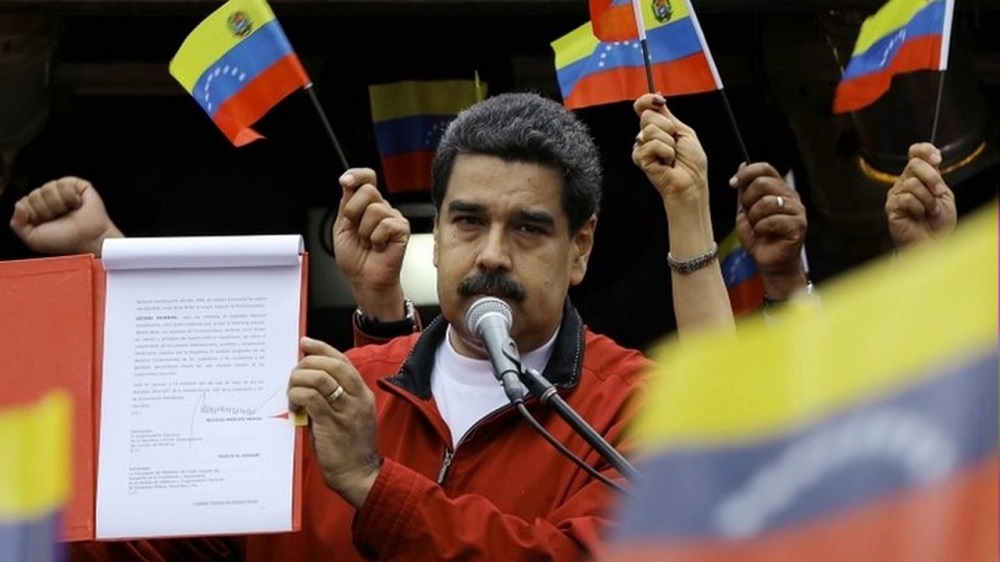Delayed for 24 hours, Venezuela President Nicolas Maduro will inaugurate on Friday the new Constituent Assembly amid allegations of vote fraud over the electoral process that led to the formation of the controversial body.
A British firm hired to handle the vote said the turnout figure given by his government was too high and Attorney General Luisa Ortega, one of Maduro’s most outspoken critics, said she has opened an investigation into what she called scandalous electoral fraud.
The opposition meanwhile said it would go ahead Thursday with a big march against the new assembly.
Maduro denied the accusations of trampling on democracy in Venezuela with Sunday’s controversial election for an all-powerful “Constituent Assembly,” dismissing them as a “reaction by the international enemy.”
The technology firm hired to handle the vote, Smartmatic, said in a London news conference that the official figures from the election were “tampered with” to make turnout appear greater than it was.
Smartmatic chief executive Antonio Mugica said the evidence of vote-tampering was glaring.
“Based on the robustness of our system, we know, without any doubt, that the turnout… was manipulated,” he said.
“We estimate the difference between the actual participation and the one announced by authorities is at least one million votes.”
Venezuela’s pro-government electoral authority had claimed more than eight million voters took part — 40 percent of the electorate.
The opposition says turnout was closer to 3.5 million, mostly state employees fearful for their jobs.
Ortega said the firm’s assessment was just “one more element of the fraudulent, illegal and unconstitutional process” initiated by the socialist ruler.
“We are facing an unprecedented, serious incident that represents a crime,” Ortega told CNN.
Significantly, the opposition had held an unofficial referendum on July 16 in which it said 7.6 million Venezuelans voted against the new assembly — just under the level of support the government claimed on Sunday.
National Assembly leader Julio Borges called the accusation of polling manipulation “an earthquake on a global scale.”
According to polling firm Datanalisis, more than 70 percent of Venezuelans oppose the new assembly.
The electoral authority itself — criticized as a Maduro mouthpiece — denied the vote-tampering allegation as “an irresponsible contention based on estimates with no grounding in the data.”
The new 545-member body — whose members include Maduro’s wife and son — will have sweeping powers to dissolve the opposition-majority congress, pass laws and write a new constitution.
Despite months of violent protests and international condemnation, Maduro insists it is the solution to a drawn-out economic and political crisis gripping Venezuela.
The assembly was originally due to start work Thursday, but Maduro postponed the launch to Friday in the face of opposition plans for massive protests.
“It has been proposed that the installation of the National Constituent Assembly, instead of being held tomorrow, be organized in peace and calm, with all necessary protocol, on Friday at 11:00 am (1500 GMT),” he said.
He said the reason for the delay was that 35 newly elected members had not yet been officially declared by electoral authorities.
Venezuela has been rocked by four months of clashes at anti-Maduro protests that have left more than 125 people dead.
Sunday’s vote brought the crisis to a boiling point, drawing international condemnation.
The United States imposed direct sanctions on Maduro, calling him a “dictator,” while the European Union joined the US, Mexico, Colombia and Argentina in saying it would not recognize the new assembly.
The United States this week called Maduro a dictator, froze his US assets, and barred Americans from doing business with him. Maduro, like his predecessor and mentor, the late Hugo Chavez, regularly laughs off criticism from Washington even though the United States is Venezuela’s top crude importer.
The European Union said it was mulling a “whole range of actions” on Venezuela. But Maduro continues to enjoy public backing from the Venezuela’s military, though soldiers are increasingly weary of the popular backlash against their role in quelling protests.
Oil workers, whom Maduro considers a bedrock of support, rallied in several energy producing regions of the country on Wednesday.
Chanting and carrying the red Socialist Party flag, they denounced sanctions on the leftist president.
“We are here to show our rejection of the intervention of the United States,” one demonstrator said during a televised rally, calling the sanctions “a political show with harmful economic consequences for the people of Venezuela.”
